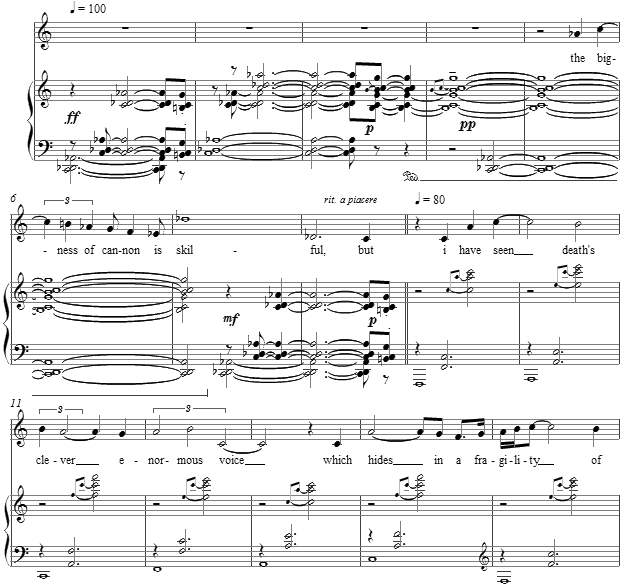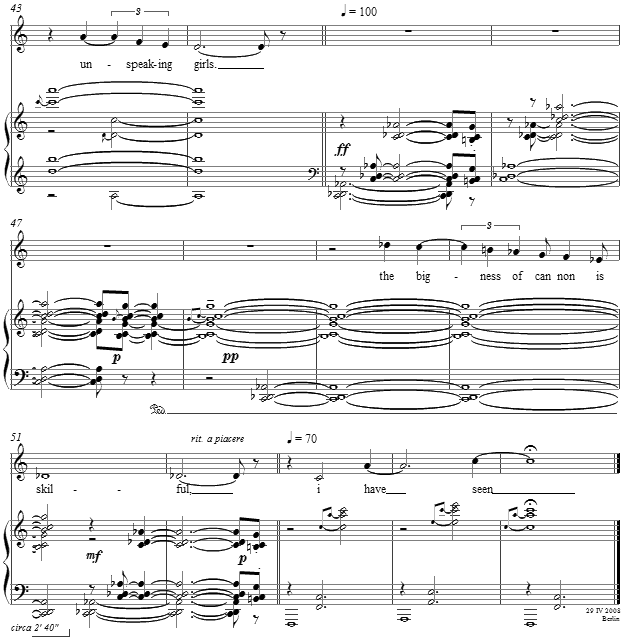Music and Texts of GARY BACHLUND
Vocal Music | Piano | Organ | Chamber Music | Orchestral | Articles and Commentary | Poems and Stories | Miscellany | FAQs
the bigness of cannon - (2008)
E. E. Cummings
for medium voice and piano
the bigness of cannon
is skilful,
but i have seen
death's clever....
(for the remainder of this text, please consult any one of the many printed and electronic sources)
"the bigness of cannon" was originally published as "II" in The Dial, Vol. 68, No. 1 (Jan. 1920),
New York: The Dial Publishing Company, Inc., Editor: Scofield Thayer,
and subsequently republished in "LA GUERRE," in Tulips and Chimneys (1923),
and several subsequent editions of Complete Poems
[ 3 pages, circa 2' 40" ]
E. E. Cummings
Cummings wrote of his Reflections of the War, Paris, Imprisonment, New York, Peace, 1918, a text titled "I along the justexisting road to Roupy," speaking of an area in northern France, around which are clustered cemeteries of the war dead from not only WWI, in which Cummings served, but also WWII. Cummings had enlisted and was sent to France where he drove an ambulance. [ 1 ] He was at one time arrested, suspicion arising that he might be a German spy. Along with others, he was kept in one room which motivated his first book, published in 1922, The Enormous Room, based on those experiences. One may know then that Cummings had direct and probably horrid experience with "the bigness of cannon" and the grim realities of the battlefield dead.
The vocal range is minimal, and thus available to all singers without the necessity of transpositions. The structure of the setting is one of contrasting motifs, the opening dissonance expressing the "bigness of cannon" and its recurrence in the setting breaks each of the sweeter strophes in F major recalling various images of death.
The final repetition of the "bigness of cannon" is again answered with the phrase, now lingering in thought, that "i have seen...." In the human psyche, there are memories and visions of which one sometimes cannot speak -- or further speak. This is the intent of the last repetition and gesture. A musical setting of a poem such as this is, to this composer's view, more adapt at pointing to the "unspeakable" through the heightened power of singing the "unspeakable."
The score for the bigness of cannon according to the text as published in 1920 is available as a free PDF download, though any major commercial performance or recording of the work is prohibited without prior arrangement with the composer. Click on the graphic below for this piano-vocal score.
NOTES
[ 1 ] In addition to Cummings, a surprising number of early twentieth century authors were ambulance drivers during World War I, including Ernest Hemingway, John Dos Passos, Somerset Maugham, Robert Service, and Charles Nordhoff. Those authors who worked in medically related fields during the war included Gertrude Stein, Marjory Stoneman Douglas, and E. M. Forster. W. H. Auden drove an ambulance in the Spanish Civil War and Walt Whitman sat with the wounded of the American Civil War, while novelist Vance Bourjaily and playwright John Patrick drove ambulances in World War II for the American Field Service. Even though Cummings experienced disagreeable things courtesy of some officers and the brutality of war itself, it is commendable that he served at all, given the modern sensibility of those whose anti-war sentiment seems more aimed at not serving than in opposing all war rather than one which their political investments oppose for political reasons rather than a devotion to pacifism.


